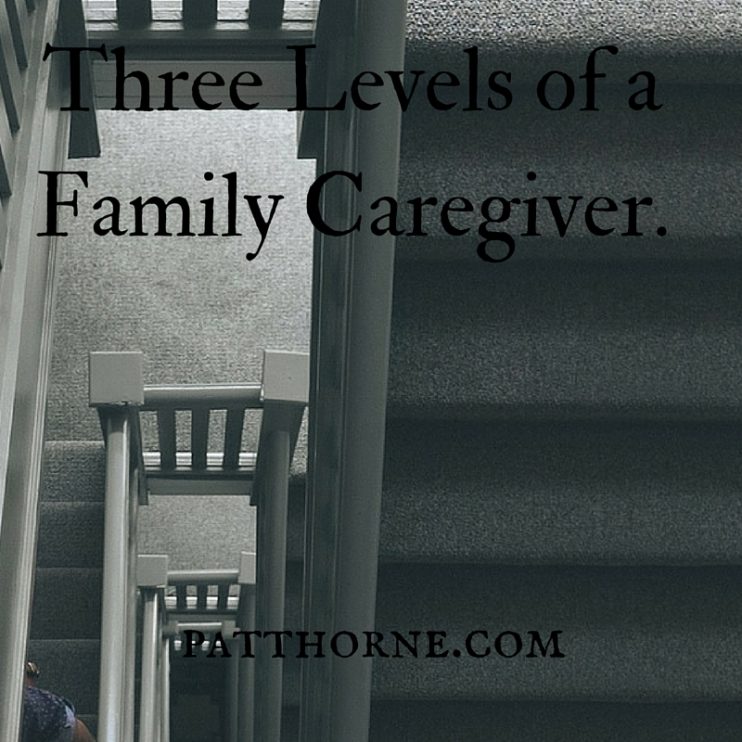I’m an Overseer – what level are you?
Many of you are finding yourself in the role of caregiver and are feeling lost and overwhelmed. In my previous post I introduced the 6 essential steps helpful to make family care giving a little easier. Understanding what your job is as caregiver is an essential first step. Not all caregivers are alike and each individual, family and circumstances are unique. So while family caregivers generally share many of the same issues and concerns, not everyone is struggling with the same issue at the same time or in the same way.
Three levels of caregiving
Since every family and caregiving situation is unique I’ve broadly defined three levels of caregiving roles. I based each on the amount of involvement or responsibility that a caregiver has at any particular time. It is important to your loved one that you “stay in your lane” and not try to do more than you are needed to do at any given time. It can be particularly challenging when the person you are caring for is struggling with some impaired judgment or thinking skills. A situation like this will require you to take more of a proactive and protective role than would otherwise be appropriate.
The Overseer
I am an Overseer; this is the level of care my siblings and I are providing at the moment. Our 91-year-old mother is very self-sufficient, lives independently and thankfully needs very little, if any help. But periodically we are called to step in to do for her, to give advice or be the second opinion. But mostly we are just watching and ready if and when things change.
Like a spotter at a gymnastic event the job of the Overseer is to watch, observe, to step in when they need a hand. This can be quite a difficult role as you have access to the person’s decision making but no real “say” in those decisions. You are the one who is asked to help drive them to appointments, cut the lawn, and take care of some household chores. You are the “on-call” help and the “go to” person for someone who is, for the most part, independent and relatively self-sufficient.
While this not a very “active” role it is an essential time to do some planning and preparation for any future changes. As an outside observer you are in the better position to anticipate and identify problems before they arise even if the solution is out of your hands. But this is also the time for you to work with your family to ensure that all of their medical, financial and legal plans and paperwork in order. Be sure you know where to find them and you that understand what rights or limits you will have as their caregiver.
The Middleman
This is a far more active role for a family caregiver and probably the most difficult. This is when you are acting as an agent for your loved one and might be implementing some of their decisions or wishes. Your role is to understand what they want and need and to provide that critical second opinion and safety net. The difficulty to being a middleman is just that you are in the middle. So while you might be more involved in their day-to-day care you are not necessarily the decision maker. It can be quite difficult to know when to step in and help and when to step aside.
This role can be even further complicated depending on the level of mental or cognitive ability of your loved one. From simple normal forgetfulness and confusion to those with more seriously impaired judgment or dementia issues this can create quite a conflict for these Middlemen caregivers. The challenge is in make the right decision in spite of their loved one’s unrealistic expressed wishes and then dealing with their resistance and frustration when they don’t understand why they didn’t get what they wanted.
The Caretaker
These are the caregivers that have taken on full responsibility for the care of their loved one. They are the primary decision maker and bear full responsibility for the needs of your loved one. But even as Caretaker it is important to remember you are still acting as someone’s agent and making decisions based on their preferences and needs. And sometimes these decisions might not necessarily be what they would do but it the best choice to maintain their highest and best quality of life.
The challenge to these full time Caretakers is in making the time to take care of themselves as well. The stress and worry of caring for another can be overwhelming so it is important that you learn to include a plan to “care for the caregiver”.
Summary
So whether you are the Overseer, the Middleman or the Caretaker it is important to know the limits of your role and to “stay in your lane”. It is especially important that at every step of this care giving journey that you maintain a strong and positive relationship with your loved one. It can be quite a challenge to keep the lines of communication open and requires active effort to avoid conflict. Care giving is stressful on everyone involved and misunderstanding and miscommunication only further complicates this relationship.
I hope you found this helpful. Please be sure to send me your comments and suggestions.
So until next time – take care of yourself and know there is
…help for the journey






